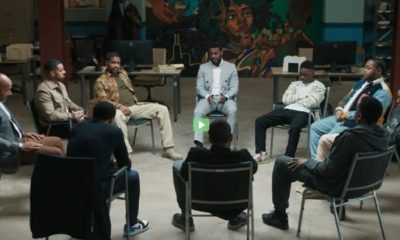Black History
COMMENTARY: A Reflection on Motherhood
mothers are brave, courageous, and will stand by their children through thick and thin, regardless of whether they are successful, or even those who have fallen by the wayside. Christian mothers have a strong belief in God – somehow, God will make a way out of no way. Even when going through trials and tribulations Christian mothers will be singing – “Troubles don’t last always.”

Rev. Dr. Martha C. Taylor
Mother’s Day is a very special day in all communities.
It’s that time of year when the sale of Hallmark cards quadruples, teleflorists spike the price of flowers and See’s Candies hires extra workers. Even with a reservation, restaurants make you wait in long lines.
Mother’s Day is a time set aside to show the one you call ‘mother’ special appreciation with gestures of love.
African Americans embrace motherhood in unique ways. There are biological mothers, stepmothers, foster mothers, and guardians. We have enduring terms for ‘mother’ such as Madea and Mama. The strength of mothers comes in all sizes. Big Mama can be short, 4’5” and is still be called Big Mama. Lil’ Mama can be 5’9”, and still be called Little Mama. It is not unusual, for grandmothers to be first responders and caregivers for their grandchildren.
For the most part, mothers are brave, courageous, and will stand by their children through thick and thin, regardless of whether they are successful, or even those who have fallen by the wayside. Christian mothers have a strong belief in God – somehow, God will make a way out of no way. Even when going through trials and tribulations Christian mothers will be singing – “Troubles don’t last always.”
Mother’s Day also brings a mixture of happy and hurt feelings. For many, Mother’s Day is a reminder that mother is no longer here. In some cases, a mother’s only child has died. One mother told me this would be the first year without her son who passed away last year from COVID-19. The death of a child does not mean you are not a mother anymore.
Some mothers are doing double duty raising their grandchildren. Some men, as single parents, have assumed the role of both father and mother. All mothers are not “mothers of the church” wearing white dresses, big hats with special reserved seats.
Still others have assumed the role of mother through adoption or by extended family.
The population of homeless mothers has significantly increased. Some are living with children in broken down automobiles trying to make ends meet for their family while the system professes to be doing a study of their plight. Some mothers are in convalescent homes, many tucked away out of eyesight of the family. Still others are blessed to have family visits.
Our hearts grieve especially for mothers who are imprisoned; they decorate their prison walls with pictures of their children.
Songwriter-rapper Tupac Shakur wrote musical lyrics about his mother who struggled to raise him through poverty. Shirley Caesar, a famous gospel singer, wrote the song “No Charge” in response to the little boy who was going to charge his mother for doing chores around the house.
The lyrics to the song “I’ll Always Love My Mama,” by the R&B group The Intruders, is a Black man’s testimony on the love of Mother.
“She’s my favorite girl, (You only get one, you only get one, yeah)
She brought me in this world.
She taught me little things like ‘Say hello’ and ‘thank you’ and ‘please’ while scrubbing those floors on her bended knees.”
A walk back in history is a reminder of the horrific experiences Black mothers endured that started in the Middle Passage during the Transatlantic Slave Trade era and continues in many ways.
The auction block, a place where enslaved African people were treated as material where families were torn apart and sold to the highest bidder. Black women were forced to be slave breeders to keep the slave industry alive. Children grew up motherless while being forced to toil and labor under the yoke of slavery.
But through it all, there is a strong belief within most Black mothers that God has not abandoned them. The hand of God elevated Black mothers from slave pits to the White House when Michelle Obama, became First Lady of America.
The bond and love between Michelle and her mother was so strong that Marian Shields Robinson retired early to live in the White House to be close to her grandchildren. Michelle and Mother Robinson wanted the sense of normalcy a genuine Black grandma could bring to the everyday life of her grandchildren.
One thing we do know, the only earthly DNA connected to Jesus came from an unwed teenager, whom God chose to be the mother of Jesus. Thirty-three years later, Mary stood at the foot of the Cross and watched the crucifixion of her son, Jesus.
And lastly, Mary is not the only one to see the light go out of her child’s eyes. Thousands of Black mothers have endured the crucifixion of their young sons and daughters through police brutality. Every Mother is special in some way.
Happy Mother’s Day.
Activism
Oakland Post: Week of April 17 – 23, 2024
The printed Weekly Edition of the Oakland Post: Week of April 17 – 23, 2024

To enlarge your view of this issue, use the slider, magnifying glass icon or full page icon in the lower right corner of the browser window. ![]()
Black History
Matthew Henson: Explorer Extraordinaire
Matthew Henson, a trailblazing explorer who overcame countless obstacles to leave an incredible mark on history. Born on August 8, 1866, in Charles County, Maryland, his journey is a testament to the power of determination and the spirit of adventure.

By Tamara Shiloh
Matthew Henson, a trailblazing explorer who overcame countless obstacles to leave an incredible mark on history. Born on August 8, 1866, in Charles County, Maryland, his journey is a testament to the power of determination and the spirit of adventure.
Henson’s life began amidst the backdrop of post-Civil War America, where opportunities for African Americans were scarce. From a young age, he possessed an insatiable curiosity about the world beyond his small town. At the age of 12, he embarked on a journey that would change the course of his life forever when he joined a merchant ship as a cabin boy.
His most famous expedition was his journey to the Arctic with renowned explorer Robert E. Peary. In 1887, Henson joined Peary’s crew as a seaman and quickly proved himself to be invaluable with his skills as a navigator and craftsman. Over the course of several expeditions, Matthew endured extreme cold, treacherous terrain, and grueling conditions as he and Peary sought to reach the elusive North Pole.
In 1908–09, Peary set out on his eighth attempt to reach the North Pole. It was a big expedition, with Peary planning to leave supplies along the way. When he and Henson boarded their ship, the Roosevelt, leaving Greenland on August 18, 1909, they were joined by a large group. This included 22 Inuit men, 17 Inuit women, 10 children, 246 dogs, 70 tons of whale meat, blubber from 50 walruses, hunting gear, and tons of coal.
In February, Henson and Peary left their anchored ship at Ellesmere Island’s Cape Sheridan, along with the Inuit men and 130 dogs. They worked together to set up a trail and supplies along the way to the Pole.
Peary picked Henson and four Inuit people to join him in the final push to the Pole. However, before they reached their destination, Peary couldn’t walk anymore and had to ride in a dog sled. He sent Henson ahead to scout the way. In a later interview with a newspaper, Henson recalled being in the lead and realizing they had gone too far. The group turned back, and Henson noticed his footprints helped guide them to their destination. At that location, Henson planted the American flag.
Henson’s legacy extends far beyond his expeditions to the Arctic. He shattered racial barriers in the world of exploration and inspired countless individuals, regardless of race, to dream big and pursue their passions. In 1937, he was finally recognized for his achievements when he was inducted into The Explorers Club, an organization dedicated to promoting scientific exploration and field research.
Matthew Henson died in the Bronx, New York, on March 9, 1955, at the age of 88.
Art
Marin County: A Snapshot of California’s Black History Is on Display
The Marin County Office of Education, located at 1111 Las Gallinas Ave in San Rafael, will host the extraordinary exhibit, “The Legacy of Marin City: A California Black History Story (1942-1960),” from Feb. 1 to May 31, 2024. The interactive, historical, and immersive exhibit featuring memorabilia from Black shipyard workers who migrated from the South to the West Coast to work at the Marinship shipyard will provide an enriching experience for students and school staff. Community organizations will also be invited to tour the exhibit.

By Post Staff
The Marin County Office of Education, located at 1111 Las Gallinas Ave in San Rafael, will host the extraordinary exhibit, “The Legacy of Marin City: A California Black History Story (1942-1960),” from Feb. 1 to May 31, 2024.
The interactive, historical, and immersive exhibit featuring memorabilia from Black shipyard workers who migrated from the South to the West Coast to work at the Marinship shipyard will provide an enriching experience for students and school staff. Community organizations will also be invited to tour the exhibit.
All will have the opportunity to visit and be guided by its curator Felecia Gaston.
The exhibit will include photographs, articles and artifacts about the Black experience in Marin City from 1942 to 1960 from the Felecia Gaston Collection, the Anne T. Kent California Room Collection, The Ruth Marion and Pirkle Jones Collection, The Bancroft Library, and the Daniel Ruark Collection.
It also features contemporary original artwork by Chuck D of the Rock and Roll Hall of Fame group Public Enemy, clay sculptures by San Francisco-based artist Kaytea Petro, and art pieces made by Marin City youth in collaboration with Lynn Sondag, Associate Professor of Art at Dominican University of California.
The exhibit explores how Marin City residents endured housing inequities over the years and captures the history of plans to remove Black residents from the area after World War II. Throughout, it embodies the spirit of survival and endurance that emboldened the people who made Marin City home.
Felecia Gaston is the author of the commemorative book, ‘A Brand New Start…This is Home: The Story of World War II Marinship and the Legacy of Marin City.’ Thanks to the generous contribution of benefactors, a set of Felecia’s book will be placed in every public elementary, middle, and high school library in Marin.
In addition, educators and librarians at each school will have the opportunity to engage with Felecia in a review of best practices for utilizing the valuable primary sources within the book.
“Our goal is to provide students with the opportunity to learn from these significant and historical contributions to Marin County, California, and the United States,” said John Carroll, Marin County Superintendent of Schools.
“By engaging with Felecia’s book and then visiting the exhibit, students will be able to further connect their knowledge and gain a deeper understanding of this significant historical period,” Carroll continued.
Felecia Gaston adds, “The Marin County Office of Education’s decision to bring the Marin City Historical Traveling Exhibit and publication, ‘A Brand New Start…This is Home’ to young students is intentional and plays a substantial role in the educational world. It is imperative that our community knows the contributions of Marin City Black residents to Marin County. Our youth are best placed to lead this transformation.”
The Marin County Office of Education will host an Open House Reception of the exhibit’s debut on Feb. 1 from 4 p.m. – 6 p.m.. All school staff, educators, librarians, and community members are encouraged to attend to preview the exhibit and connect with Felecia Gaston. To contact Gaston, email MarinCityLegacy@marinschools.org
-

 Activism4 weeks ago
Activism4 weeks agoOakland Post: Week of March 27 – April 2, 2024
-

 #NNPA BlackPress4 weeks ago
#NNPA BlackPress4 weeks agoCOMMENTARY: D.C. Crime Bill Fails to Address Root Causes of Violence and Incarceration
-

 #NNPA BlackPress4 weeks ago
#NNPA BlackPress4 weeks agoMayor, City Council President React to May 31 Closing of Birmingham-Southern College
-

 #NNPA BlackPress4 weeks ago
#NNPA BlackPress4 weeks agoBeloved Actor and Activist Louis Cameron Gossett Jr. Dies at 87
-

 Community1 week ago
Community1 week agoFinancial Assistance Bill for Descendants of Enslaved Persons to Help Them Purchase, Own, or Maintain a Home
-

 Activism3 weeks ago
Activism3 weeks agoOakland Post: Week of April 3 – 6, 2024
-

 Business1 week ago
Business1 week agoV.P. Kamala Harris: Americans With Criminal Records Will Soon Be Eligible for SBA Loans
-

 Activism2 weeks ago
Activism2 weeks agoOakland Post: Week of April 10 – 16, 2024






















































